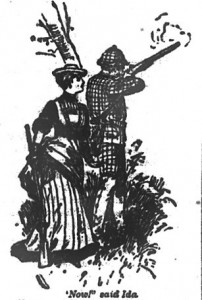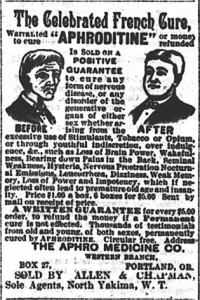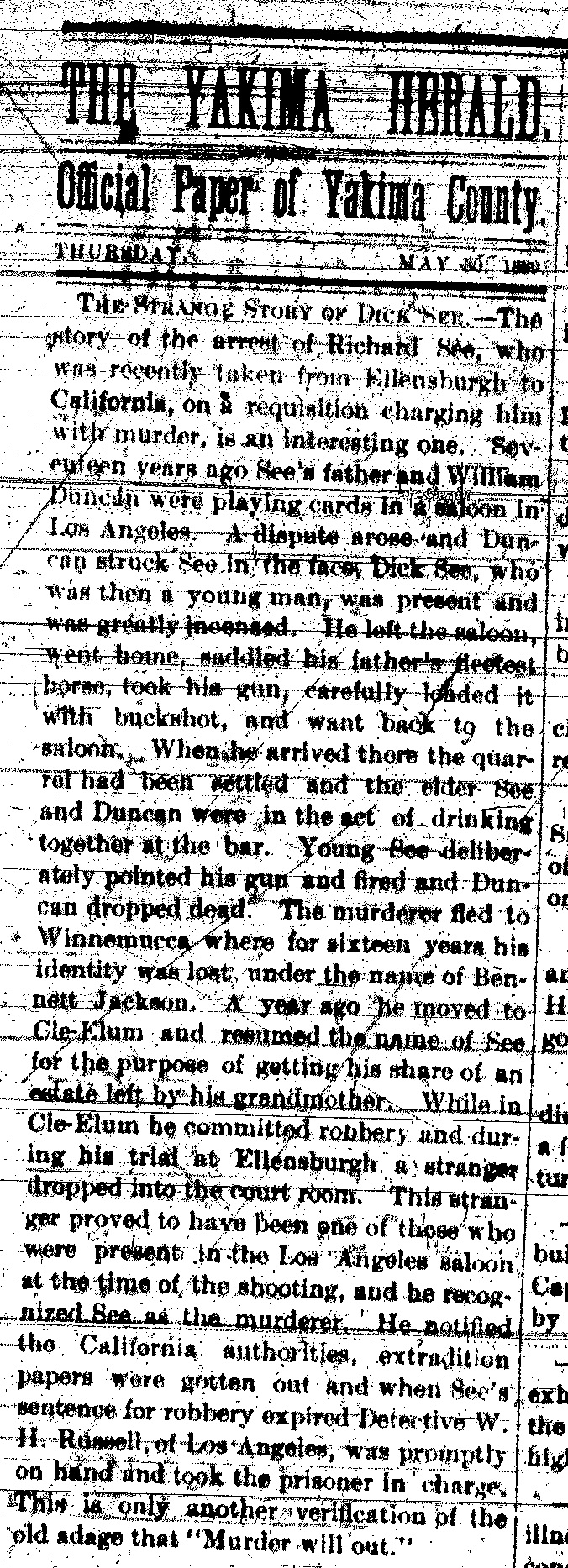From the desk of Marlys Rudeen
The year is 1889 and Washington Territory is on its way to becoming Washington State. There’s a great deal of enthusiasm for the process, and a great deal of regional competition as a constitutional convention is held along with fierce debate about which city should be the capital of the new state. While all this is going on the residents of Yakima are also devouring news from back East, local comings and goings and, judging from the ads, a lively commercial sector.
I’ve skipped through several issues and found some entertaining stories. To browse through the issues of the Yakima Herald on your own go to and select issues from the list of dates on the left or from the calendar display on the right.
p. 2 Evidently looking forward to the prospect of Statehood, the citizens of North Yakima had offered to host a constitutional convention is their fair city at no cost to the Territory. The editors of the Seattle Post-Intelligencer had objected strenuously to the proposal, though whether they truly felt it was premature, or were irritated that the convention might be held someplace other that Seattle is left to the reader to determine. The Yakima Herald editor is pretty sure he knows the reason and has some fun quoting the PI’s contradictions and spoofing what he sees as their pomposity. See “Constitutional Convention at North Yakima” and “Communication”.
p. 3 In the “Personal” column comings and going are noted carefully including some the principals might prefer not be mentioned. “Mrs. Frank Riggle has gone to Island City to remain. Matrimonial infelicity is said to be the cause of her departure.” Under “Backing his Opinion” a viticulturalist buys a shipment of grape cuttings and predicts that the Yakima Valley will rival California as wine and grape country.
p. 4 In a list of text ads – “A nasal injector free with each bottle of Shiloh’s Catarrh Remedy…” (Erg!)
p. 5 A new serial novel begins – “The Mystery of a Hansom Cab.” (These novels were quite popular during this time, printed in sections over several weeks or months.)
March 7, 1889
p. 2 “The Pacific Northwest” Charles Skeels, a Spokane saloonkeeper, is fatally shot by his wife who objected to his attentions to two “variety actresses”. “Mrs. Skeels bears a bad reputation, being known in the Coeur d’Alene country as ‘Bunko Liz’.”
p. 3 “Surprise Party” Capt. J. H. Thomas and family were guests of honor at a surprise party which was truly a surprise “for the Captain was in bed and asleep.”
p. 4 Ads – “If you have lost any money lately, Redfield will return it by selling you goods so remarkably cheap that you will forget your misfortune.” And “Shiloh’s Vitalizer is what you need for constipation…”
Apr. 4, 1889
p. 2 Ads – “For weak and delicate women nothing builds up the entire system more thoroughly and effectually than Oregon Kidney Tea.”
p. 3 “A Terrible encounter” Harry Hampton’s battle with a 12-pound trout is reported. Worried that the trout would take off with his new split-bamboo rod, he threw himself into the creek after it. “The encounter was terrific. Sometimes the fish had Hampton down and then the positions were reversed, but finally Hampton conquered, and pale and panting, he at last landed his prey.”
“Personal”
“John G. Boyle is back from Washington. He looks happy, but it is not known what office he was promised.”
Apr. 19, 1889
p. 5 A new serial novel begins – “Colonel Quaritch, V.C. by H. Rider Haggard.”
May 16, 1889
p. 1 “Are Times Degenerate? – Bishop Potter says Yes.” In the report of sermon in NY, the Bishop warns of the dangers of “mistaking bigness for greatness and sadly confounding gain and godliness.”
May 30, 1889
p. 3 “Local Brevities” “Ellensburgh is thronged with rough characters and a special force of police is required to maintain order.” (A persistent rivalry with Ellensburgh is noted throughout the issues.)
June 6, 1889
p. 1 The question of where the new state’s capital should be is of great interest. Candidates vying for the position: Pasco, Centralia, Ellensburgh, Walla Walla, Spokane Falls, etc.
p. 3 “She wasn’t Mrs. Gillum” – recounts the interesting history of an fashionable couple who spent several weeks in Yakima. A Mr. Gillum, a life insurance salesman who made “a very gentlemanly appearance,” and his wife, “a well-rounded blonde” who was fond of whist and maybe a bit of poker – just with friends, of course. Amazingly, though “she disclaimed more than a very slight knowledge of the game she was always remarkably lucky.” The gentlemen of Yakima enjoyed her company but the ladies never took to her. After they left and set up in Spokane Falls, Gillum’s divorced wife showed up claiming that the young child with them was hers and that Mr. Gillum had never married his blonde companion. The miscreants escape down the back stairs.
“Local Brevities” “Colonel Prosser has a telegram announcing the loss in the terrible Johnstown flood of his step-mother, two half-sisters and a number of other relatives.”
Aug. 15, 1889
p. 2 “Yakima the Capital” The editor makes his case that Yakima is really the only reasonable place to locate the new state capital. “Even the Olympia people believe this, when they are honest with themselves…”
Oct. 10, 1889
p. 1 “How a state is made” The new state constitution has been adopted and a federal act is now required to become a state. The process is discussed in a question and answer session with Supreme Justice-elect, John P. Hoyt.
p. 2 “Falsehood Pure and Simple” Evidently, North Yakima has lost its bid to become the new capital, and blames its opponents for misrepresenting it as “a Northern Pacific town, and that the company was aiding us by its influence and money.”
Nov. 14, 1889
p. 2 “We are now a state… The emancipation from territorial vassalage was received in some giddy cities with the burning of powder, patriotic speeches and champagne for the rich – whiskey and beer for the poor. Here in dignified Yakima we smiled a smile of satisfaction and moved along the even tenor of our way, building three-story brick business blocks, handsome residences and projecting new and greater enterprises for the coming year.”
p. 3 “The city has been on its bad behavior this week. Nine ‘drunk and disorderlies’ occupy the municipal jail. Five men were arrested today for fighting.” One of the jail’s residents moaned, “’What is getting into this town of Yakima?’ Other have asked the same question. The marshal says the prisoners shall work on the streets under ball and chain.”
Additional newspapers for Washington can be found at Historic Newspapers at the Washington State Library’s web site. The State Library is a Division of the Office of the Secretary of State.
More Washington newspaper titles have been digitized through a grant from the National Endowment for the Humanities under the National Digital Newspaper Program. These and many other American newspapers can be found online at Chronicling America at the Library of Congress.








